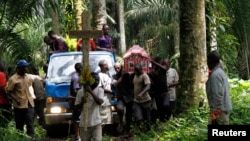A U.N. human rights official said this week that Ugandan Islamist ADF rebels were mainly responsible for the summary executions of at least 237 civilians in the eastern Democratic Republic of Congo between October and December last year.
The killings were among more than 300 that have occurred since October in a series of attacks on civilians in Beni territory.
Between October and January, U.N. investigators went on 13 missions to the area, visiting several massacre sites and speaking to 180 direct and indirect witnesses of the killings. On Wednesday, the head of the U.N. Human Rights Office in the D.R.C., Jose Maria Aranaz, gave reporters a brief summary of their findings.
The main conclusion, he said, is that the killings in the last quarter of 2014 were carried out in a systematic, premeditated way, primarily by the ADF. The report said that although the ADF leaders are Ugandan, most of the rank and file are Congolese, which would explain why many who saw the attackers said they spoke Congolese languages.
The investigators also heard allegations that ordinary citizens and some authorities in Beni territory helped the ADF carry out the massacres, with information and logistics.
Aranaz added that at least 300 people were arrested by Congolese authorities in connection with the massacres and at least 33 Congolese army soldiers were arrested as part of the fight against impunity.
D.R.C. Information Minister Lambert Mende condemned the atrocities. He told VOA that the ADF had been totally indiscriminate, killing many women and children and often hacking their victims to pieces.
He said the Congolese army was continuing intensive operations against the ADF, penetrating deep into the forest where its special forces captured the terrorists’ headquarters and killed its No. 3 leader on April 20.
Mende confirmed that the authorities had arrested many local people in Beni, including soldiers, some of whom have already been tried and convicted. He added that following the arrest of ADF leader Jamil Mukulu in Tanzania, the DRC government asked for Mukulu to be extradited to stand trial in Congo.
The U.N. report on the massacres covers only the period up to December 31. Since then, massacres have continued, although not on the same scale.
VOA interviewed several civilians who survived the attacks, including a young man who was recovering from machete wounds to his head. He said he was sure that the people who attacked them were ADF rebels, because some of them were children and they spoke a language he could not understand.
Another survivor, Kambale Katinda, who was shot in the foot but managed to escape, said he was ambushed; he looked up and saw he was surrounded by the enemy. They lined up and aimed their weapons at him, but several were carrying only machetes.
Kambale added that if it were not for the Congolese army, just a few hundred meters away, he would not have survived.










